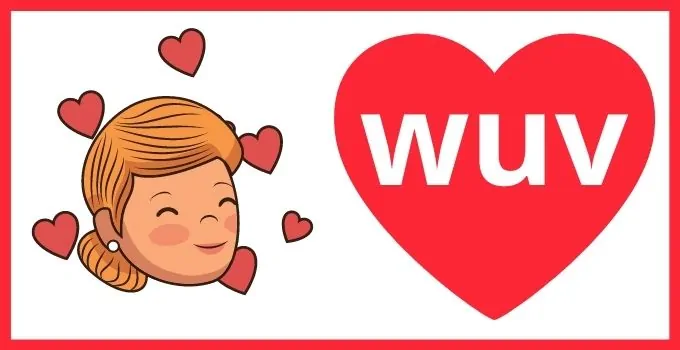The internet is a fascinating place.
Anyone with a specific interest, no matter how unusual or unique it may seem, is likely to discover like-minded individuals online and connect with them.
This is why there has been a sudden surge in baby talk, which can be observed with words like “Roar xD” and “I wuv you.”
What is the meaning of wuv?
The meaning of “wuv” is “love” in baby speak. Hence, “I wuv you” means I love you. It’s supposed to be a cute, infantile way of saying it. “Wuv” can also be used in sentences other than “I wuv you.” You can say “I wuv hugz” to mean “I love hugs,” where “hugz” becomes slang for “hugs.”
When and how to use “I wuv you”?
Using baby speak in general is a form of play, so you really want to use it with people you are familiar with.
For instance, if your boss asks you about your favorite football team, you can’t tell him that you “wuv” them. That would just come across as juvenile and unprofessional.
Instead, you want to use it with people who are close to you or even your pets.
For example, if you are playing around with your significant other, it’s entirely fine to tell them something along the following lines.
I wuv you siwwy.
In the above sentence, “siwwy” is baby talk for “silly.”
This sentence would be appropriate if you felt that you’re significant other might have behaved foolishly as a result of something juvenile, and you want to highlight both their foolishness and childishness while still being playful and reassuring about it.
It’s a simple way of expressing several things.
My dog wuvs me.
Here, since you are referring to your dog, and we all assume that our dogs are little children at heart, it makes sense for you to use baby speak with your dog.
It becomes all the more appropriate to use it when the dog is small or when it is cute and cuddly.
In the above two examples, “I wuv you” was used to say something about the person or pet we were speaking about.
It was used to highlight that they resembled babies in some sense, and who doesn’t think babies are cute?
However, you can also use “I wuv you” to say something about yourself.
If you want to send across that you are cute or cuddly, you can definitely tell your SO “I wuv you.” It can be endearing, especially if the person you’re talking to is in on the joke.
Obviously, when a term highlights an individual’s childish nature, said term can be used to tease others, and the same applies here.
For instance, if your best friend is dejected that they got rejected by their crush, you might tell them something along the following lines.
Awww. So, you told her you wuv her but got rejected, how sad? Dude, get over it and move on.
Where does “I wuv you” come from?
“Roar xD” is another form of baby talk that also means I love you.
However, while “Roar xD’s” origins have more to do with the internet and meme culture, “I wuv you” actually originated from how babies talk.
You see, when babies begin to learn how to speak, they find some letters easier than others.
For example, they can get stumped pronouncing their “l’s” and their “r’s” while having no problems with their “m’s” and their “p’s.”
This is why toddlers can start saying words like “mama” and “papa” at a very early age yet struggle with a word like “rat.”
In fact, children will turn their “r’s” and “l’s” into “w’s,” making it easier for them to pronounce. After all, who hasn’t watched the cartoon with the “wascilly wabbit”?
(For reference, “the wascilly wabbit” is Bugs Bunny, a beloved character in the childhood of any millennial.
And, “wabbit” is actually baby speak for “rabbit,” but the “r” has been turned into a “w”)
So, with all this in mind, it should come as no surprise that children will say “I wuv you” before they go on to say “I love you,” and this is where this expression comes from.

Hey fellow Linguaholics! It’s me, Marcel. I am the proud owner of linguaholic.com. Languages have always been my passion and I have studied Linguistics, Computational Linguistics and Sinology at the University of Zurich. It is my utmost pleasure to share with all of you guys what I know about languages and linguistics in general.

